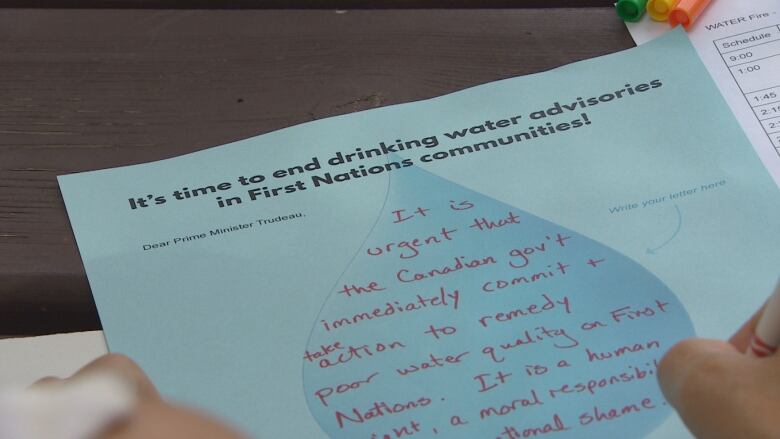Deprived and isolated: 13 Fires Winnipeg outlines price Shoal Lake No. 40 pays as city's water source
'The privileges for receiving water has denied access to water to an Indigenous community,' organizer says

A local group is working to make those in Winnipeg aware of the source of their water and the steep price one Manitoba First Nationcontinues to payfor it.
On Saturday, 13 Fires Winnipeg a groupdevoted to acknowledging racism in the citygathered in Stephen Juba Park to host Reflects in Water, a live art installation.
- Road to isolated Shoal Lake First Nation a long-awaited step in tangled history
- Shoal Lake 40 and Winnipeg's drinking water: What's at stake?
There, people used spray bottlesfilled with water from Shoal Lake No. 40 First Nation water that, for almost 20 years, has not been considered clean enough to drink without first boiling to stencil quotes from community members onto the pavement.

For nearly 100 years, the City of Winnipeg has been using an aqueduct to draw fresh water from the Indigenous community. It was first built when then-mayor Thomas R. Deacon won a 1913 landslide victory, promising a safe supply offresh water for the city.
Construction of the 135-kilometre aqueduct endedin 1919 at a cost of $17 million.
The price Shoal Lake No. 40 paid was much higher.
By building the aqueduct and a nearby water channel, the City of Winnipeg flooded the First Nation and cut it off from the mainland, creating an artificial island. The community has remained isolated ever since.
"When I have kids and they have kids, I want my grandkidsto have good, clean water to swim in," one of the quotes on the pavement read on Saturday.
Sadie-Phoenix Lavoie spoke to a small crowd gathered in the park feet away from the stenciled quotes, saying those in Winnipeg lack awareness about the source of their water, and the story behind it.

"[They]need to understand that the privileges that they have received for receiving water has denied access to water to an Indigenous community on the other end of the aqueduct pipe," she said.
Lavoie, who was born and raised on Manitoba's Sagkeeng First Nation, moved to Winnipeg to further her education. She is an active member of 13 Fires, which, shesaid, evolved out of a racial inclusion summit in September 2015.
Saturday marked the group's eighth public gathering.
"[We] host events every month on particular issues that are dealing with racism and racial inclusion," she said.
The next part in the conversation series is expected to take place in Winnipeg in August.
with files from Cameron MacIntosh












_(720p).jpg)


 OFFICIAL HD MUSIC VIDEO.jpg)
.jpg)



























































































